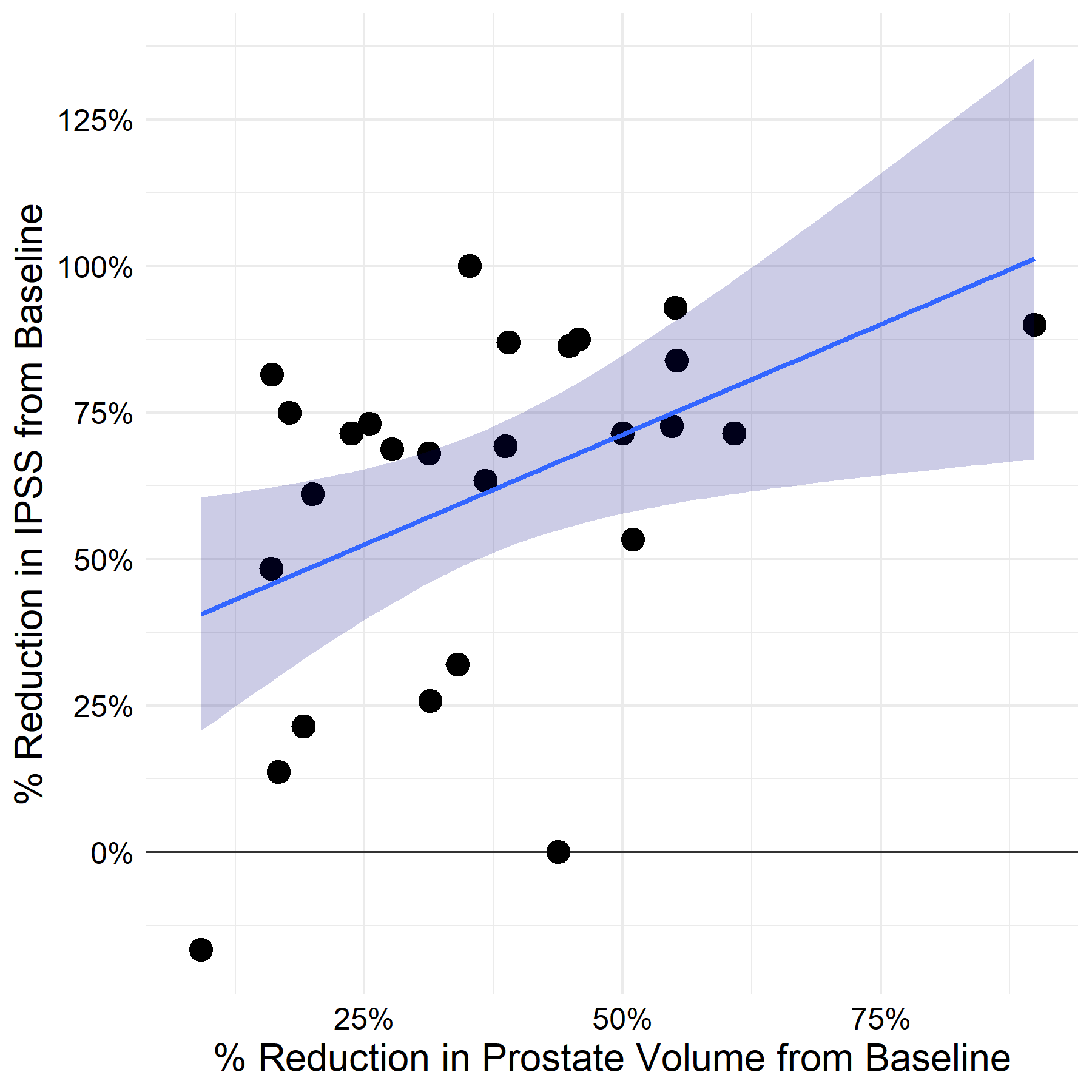Back
Poster, Podium & Video Sessions
Podium
PD45: Benign Prostatic Hyperplasia: Surgical Therapy & New Technology IV
PD45-04: Change in prostate volume reduction and symptomatic improvement in men treated with Rezum convective water vapour thermal therapy
Sunday, May 15, 2022
1:30 PM – 1:40 PM
Location: Room 252
Dean Elterman*, Katherine Lajkosz, Toronto, Canada, Kevin C Zorn, Montreal, Canada, Bilal Chughtai, New York, NY, Naeem Bhojani, Montreal, Canada
- DE
Dean Sol Elterman, MD
MD, MSc, FRCSC
University of Toronto
Podium Presenter(s)
Introduction: Rezum, convective water vapour thermal therapy is a minimally invasive, office-based treatment for benign prostatic enlargement (BPE). While studies have demonstrated its efficacy in symptom improvement, its effect on objective measures such as prostate volume reduction is poorly characterized. Herein, we evaluate change in prostate volume and the relationship to improvement in symptom score.
Methods: Quality of life outcomes and prostate volume were assessed as baseline and 12-months post-procedure. Percent change from baseline in outcomes and prostate volume were calculated for each patient. The injection to baseline volume ratio was calculated for each patient. The association between total number of vapour injections and changes in outcomes and prostate volume were evaluated using linear regression models.
Results: A total of 49 patients underwent the procedure between April 2019 and September 2020, with a mean of age of 67.8 (SD=9.4), mean baseline volume of 73.2cc (SD 27.9) and mean number of vapour injections was 11.0 (SD 3.5). At 12 months, the mean percent change in prostate volume was -30.2% (SD 29.1), with 45/49 (91.8%) patients overall having reduced volume at 12 months. Within the 45 patients with reduced volume at 12 months, every 10% increase in volume reduction was associated with a 7.5% (95% CI 1.40 to 13.6%, p=0.011) decrease in IPSS score at 12 months. There was no significant association between total number of injections or injection to baseline volume ratio and change in volume.
Conclusions: In this cohort of larger size prostates, we demonstrated a 30% prostate volume reduction at 12-months, with a correlation between greater volume reduction and greater symptomatic improvement. There is no association between more injections or the ratio of injections to prostate volume and change in size, refuting the claim that more injections are better.
Source of Funding: Not applicable

Methods: Quality of life outcomes and prostate volume were assessed as baseline and 12-months post-procedure. Percent change from baseline in outcomes and prostate volume were calculated for each patient. The injection to baseline volume ratio was calculated for each patient. The association between total number of vapour injections and changes in outcomes and prostate volume were evaluated using linear regression models.
Results: A total of 49 patients underwent the procedure between April 2019 and September 2020, with a mean of age of 67.8 (SD=9.4), mean baseline volume of 73.2cc (SD 27.9) and mean number of vapour injections was 11.0 (SD 3.5). At 12 months, the mean percent change in prostate volume was -30.2% (SD 29.1), with 45/49 (91.8%) patients overall having reduced volume at 12 months. Within the 45 patients with reduced volume at 12 months, every 10% increase in volume reduction was associated with a 7.5% (95% CI 1.40 to 13.6%, p=0.011) decrease in IPSS score at 12 months. There was no significant association between total number of injections or injection to baseline volume ratio and change in volume.
Conclusions: In this cohort of larger size prostates, we demonstrated a 30% prostate volume reduction at 12-months, with a correlation between greater volume reduction and greater symptomatic improvement. There is no association between more injections or the ratio of injections to prostate volume and change in size, refuting the claim that more injections are better.
Source of Funding: Not applicable


.jpg)
.jpg)